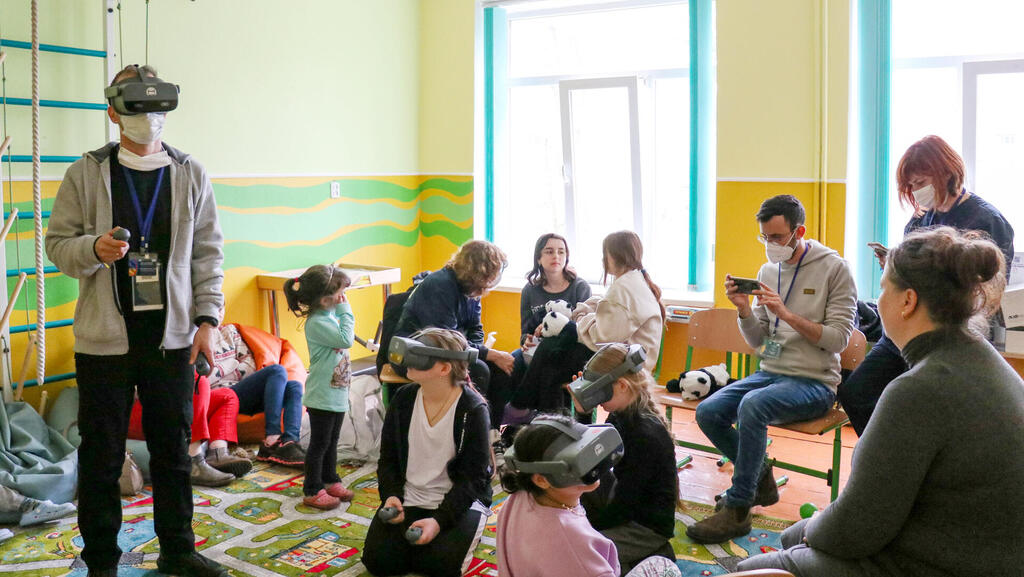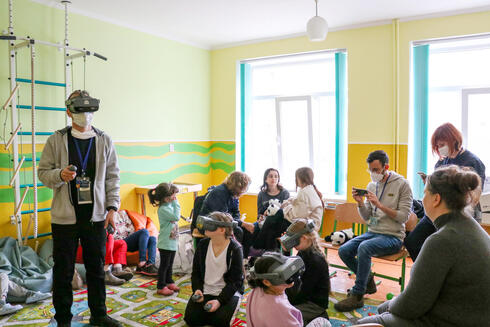
Israel's field hospital in Ukraine using VR to treat refugees
The staff of Israeli field hospital “Kohav Meir” visited a refugee camp for Ukrainians displaced from their homes equipped with advanced VR goggles, and telehealth devices to diagnose patients remotely
A small delegation of medical professionals from Israel’s field hospital “Kohav Meir” in Mościska, Western Ukraine, visited last week a nearby local elementary school, which became an improvised absorption center for war-torn refugees. The medical delegation arrived equipped with stuffed animals, coloring pages, crayons, and even a few medical-grade virtual reality (VR) goggles. When they arrived they met with a group of 10 children and their parents, who arrived from some of the hardest hit areas in Ukraine, and provided them with first-aid and mental health relief services.
When the time came to assemble the VR goggles, which were developed by Israeli startup XRHealth, the change in the atmosphere was palpable. “There was a small boy who sat on the side and barely spoke,” Liron Wasserman Ben Yehuda told Calcalist, who serves as a representative of Beyond, Sheba Medical Center’s field hospital telehealth branch. “We put the goggles on him, and it showed him a virtual reality image of him swimming in an aquarium. Within seconds, he had a smile on his face and began communicating with us. His excitement and happiness returned within minutes. He was in a completely different reality than he lives in now.”
This mental treatment is just the tip of the iceberg in Kohav Meir's advanced technological and medical imaging capabilities, which includes medical grade devices that allow doctors in Israel to perform full physical examinations on Ukrainians while using advanced imaging, and allows senior medical experts to also advise field medical staff.
“We’re changing the paradigm of humanitarian medicine,” said Dr. Galia Barkai, the Manager of Sheba Beyond, who returned to Israel this week after two weeks in Ukraine. “We can provide much higher quality medical services in the field, and it takes medical assistance eight steps forward.”
This technological advancement received a significant boost following the outbreak of Covid-19.
“At the end of the first wave we realized that there are a lot of opportunities to make medicine accessible to everyone in their home," Barkay said. “Regulatory medical obstruction significantly decreased which allowed us to provide treatment remotely. A year and a half ago Sheba made a decision to establish the Sheba Beyond branch to bring hospital-grade treatment to anyone anywhere using different technologies. While our core activity relies on video consultations, other methods such as remote monitoring, remote physical examinations, and VR technologies are also being used.”
In terms of humanitarian medical services, she said: “We can make much better quality medical services accessible in the field, bring in senior experts, offer professional and detailed information, conduct simulations, and more."
Israeli telehealth company Pulsenmore developed a small device that includes sensing equipment and attaches to a smartphone, using its screen and computational and connectivity capabilities. “We succeeded in using it to conduct ultrasounds on pregnant women, while an expert doctor in Israel directed the ground team in Ukraine, who are not members of the medical staff,” said Barkay. “Using this pilot, we saw the possibility, and started using more telemedicine technologies, which allow us to bring upgraded capabilities to field hospitals. We also have a pharmacy that is managed by an inventory management system just like any other hospital in Israel.”
This requires a very stable communications infrastructure, which isn’t necessarily a given in a war zone.
"The tech people began preparing the infrastructure for weeks before the hospital opened. They tried for a week to establish a stable communication system by using two large satellite dishes which we brought from Israel and it didn't work. Fortunately, the mayor of the town gave us everything we needed and we were able to physically connect to the internet and establish a secure hospital line. The line allows us to connect to medical experts and our health system in Israel, and now functions as a consultant clinic that has already treated around 100 patients. We also deployed video call capabilities in the emergency room and the children’s ER, and when there was a heavy load, the ER doctor in Israel had access to the medical file and provided medical assistance.”
“We extensively rely on a device developed by Israeli startup TytoCare, which makes it possible to perform remote medical examinations. It's basically an elaborate stethoscope that amplifies and transmits breathing and heartbeats, and I can hear a patient's lungs and heart beat as if I'm right there. It also includes ear and throat tests that can take videos and pictures, and broadcast them live to doctors. All the testing and consultations can be done using the device, which is also guided by artificial intelligence during the course of the exam. It can also photograph skin lesions, connect to pulse oximeters, and take temperatures. The device allows doctors to conduct full-physical examinations almost entirely remotely.”
Related articles:
The technological equipment is also used by the teams to treat mental health issues. "We visited a school that turned into a refugee absorption center," said Bela Ben Gershon, who serves as a mental health expert at the Ministry of Health and head of mental health services in the delegation. "We gathered a group of ten kids aged 2-14, and their parents. The children were from Kiev, Maripol, Charakov, and most of their homes were completely destroyed. In one case, a mother left her home for 10 minutes to get water, and was never seen again, leaving her children alone with their grandmother. They saw dead bodies littered on the streets, and one child came under fire and had to crawl under cars to reach the train to escape. Children are suffering from sleep apnea, and are scared to close their eyes so that horrible images don't reappear. Pre-teens went back to bedwetting. They jump every time they hear a noise, because it reminds them of explosions. They have all the symptoms of severe post-trauma."
"In treatment, they're given a feeling of empowerment, so that they don't feel like they're victims anymore, and we help them reframe what happened, and realize that the traumatic event is over. Using VR goggles takes them to a safe place, and helps them make that connection and feel that internal self-confidence again. You're in a bubble that allows you to calm down inside. You wear them and are given instructions to move around for a bit. And suddenly you see the smile return to their faces, their muscles relax, and their facial expressions change. The symptoms decline, and that points to the possibility of better recovery and helps prevent chronic PTSD."
Will you stay in touch with the healthcare system in Ukraine?
"One of the hardest things about starting a field hospital is the day you must depart, and if you don't properly prepare it could lead to major disappointment. We have close ties with the healthcare services in Ukraine, and aside from our training courses, we also provide instructions for telehealth sessions. We received donations so we can leave our TytoCare devices and VR goggles with the Ukrainians. We are training local medical professionals who can use our devices later on, and stay in touch with us."
